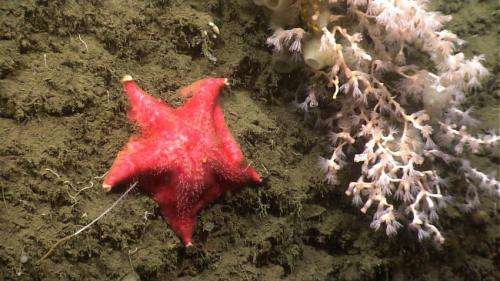Mid-Atlantic states release course of action, convene experts on deep sea canyon science

The Mid-Atlantic Regional Council on the Ocean (MARCO) has recently adopted a Course of Action to consider and develop recommendations to strengthen federal protection of submarine canyon habitats. MARCO's recommendations to federal agencies will be based on synthesis of existing data.
MARCO is working with its five member states, Virginia, Maryland, Delaware, New Jersey and New York. "We're taking an important step towards collaboratively addressing shared marine habitat priorities in the Mid-Atlantic region," says Gwynne Schultz of Maryland's Department of Natural Resources who chairs MARCO's Management Board.
A number of submarine canyons exist along the continental shelf edge in the Mid-Atlantic region. Current data suggest these canyons support unique, highly diverse, and vulnerable habitats. More documentation and exploration is underway to refine and expand our understanding of these important offshore areas.
To gain clarity on the exceptional ecological and significant economic importance of the submarine canyons, MARCO assembled regional science experts and explorers in Baltimore on Friday, September 12 as a part of the Star-Spangled Spectacular in the Inner Harbor.
MARCO's development of the course of action also coincides with the launch of a federally funded expedition to explore several submarine canyons. From September 4 to October 7, 2014, the NOAA Ship Okeanos Explorer is exploring the largely unknown deep-sea ecosystems of the U.S. Atlantic coast with a special emphasis on the canyon structures. Earlier this year, MARCO provided a list of priority canyons for exploration to the Okeanos team, helping to guide the scientific direction of the expedition.
More information: The full Course of Action Statement can be found at: midatlanticocean.org/wp-conten … nyons.2014.09.12.pdf
Information on the Okeanos Explorer 2014 Atlantic Canyons Expedition may be accessed at: oceanexplorer.noaa.gov/okeanos … /ex1404/welcome.html
Provided by Mid-Atlantic Regional Council on the Ocean





















